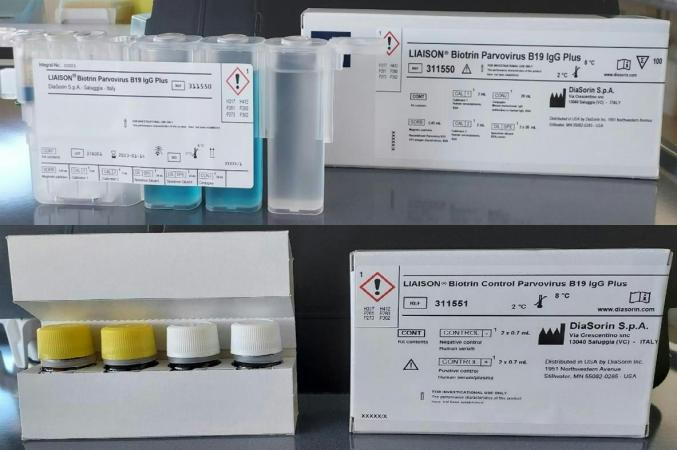LIAISON Biotrin Parvovirus B19 IgG Plus, LIAISON Biotrin Control Parvovirus B19 IgG Plus – P220034
This is a brief overview of information related to the FDA’s approval to market this product. See the links below to the Summary of Safety and Effectiveness Data (SSED) and product labeling for more complete information on this product, its indications for use, and the basis for the FDA’s approval.
Product Name: LIAISON Biotrin Parvovirus B19 IgG Plus LIAISON Biotrin Control Parvovirus B19 IgG Plus
PMA Applicant: DiaSorin Inc.
Address: 1951 Northwestern Avenue, Stillwater, MN 55082
Approval Date: March 29, 2024
Approval Letter: Approval Order
What is it?
The LIAISON Biotrin Parvovirus B19 IgG Plus is a laboratory test used to detect human parvovirus IgG antibodies against the parvovirus B19 antigen in the blood. This test is used with the LIAISON XL analyzer that runs the lab test and analyzes the results. The LIAISON Biotrin Control Parvovirus B19 IgG Plus is used as a quality control to ensure that the test is working properly.
A sample of a patient’s blood is taken and sent to a clinical laboratory. The part of the blood that is liquid (serum or plasma) containing the antibody is separated and then run using the LIAISON Biotrin Parvovirus B19 IgG Plus test on a LIAISON XL analyzer where it is mixed with test chemicals. If there are Parvovirus B19 antibodies in the sample, they attach to the chemicals and special particles in the test to generate a light signal. The light signal is measured by the LIAISON XL analyzer.
The test is used in women of childbearing age where there is a suspicion of exposure to human parvovirus B19. The presence of antibodies against the parvovirus B19 antigen can help determine if a person has been exposed to parvovirus B19V (one type of human parvovirus). The test is also an aid in the diagnosis of “fifth disease” (erythema infectiosum). It is available by prescription only.
The results of this test, in combination with other clinical information, may be used by a clinician to help diagnosis parvovirus B19 infection.
This test does not have specific situations when it should not be used (contraindications).

